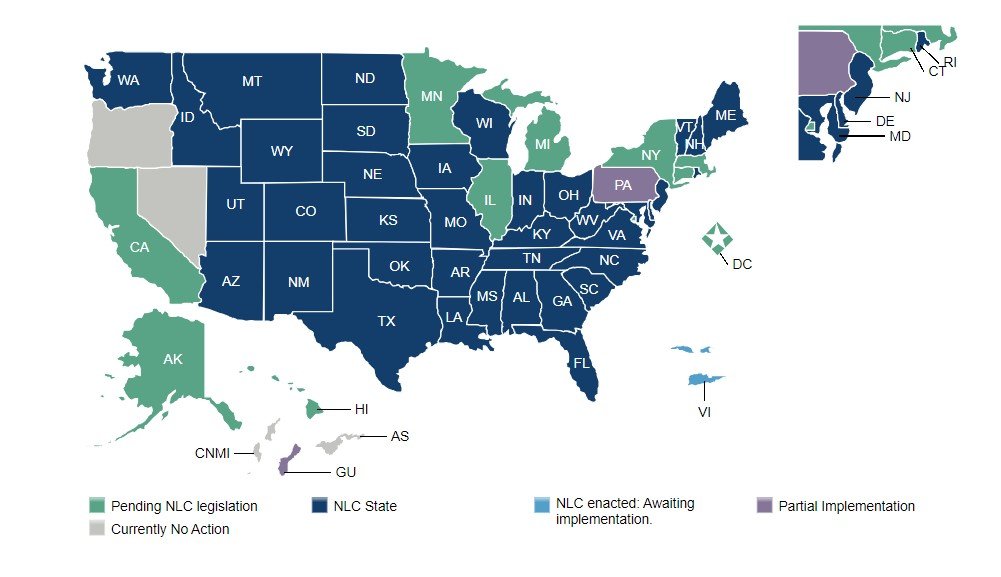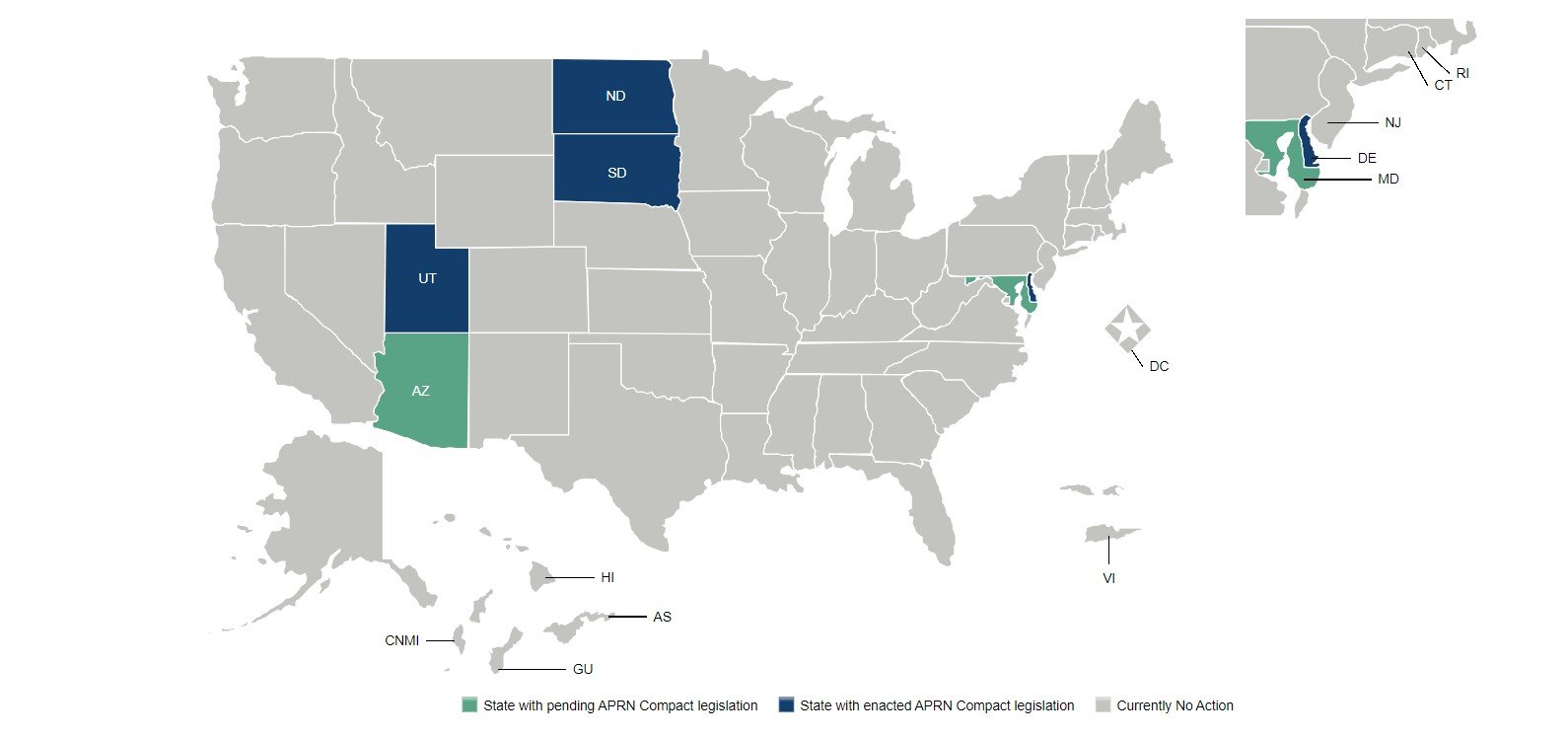In the dynamic landscape of nursing, licensure is not a one-size-fits-all concept. Nurses seeking to practice their profession must navigate through various licensure options–namely, state and compact licenses. Learning the nuances between the various types of licensure is crucial for nurses as they embark on their career journeys. It’s essential to understand the disparities between licenses and their respective advantages, limitations, and implications for nursing practice.
Experienced nurses will already know that a compact license allows for practice in multiple states, while a state license only applies to one state. However, that’s just scratching the surface. Standards, laws, and practices are constantly evolving to meet the needs of the healthcare workforce, and there isn’t a universal license that suits everyone. Compact licenses, in particular, have undergone various changes in the past several years to improve access and standardization.
The Nurse Licensure Compact
Recognizing the evolving needs of healthcare delivery and the mobility of the nursing workforce, the Nurse Licensure Compact (NLC) was established to facilitate interstate practice for registered nurses (RNs) and licensed practical/vocational nurses (LPN/VNs). Administered by the National Council of State Boards of Nursing (NCSBN), the compact (or multistate) license allows nurses to practice in participating states and territories without applying for a separate state license.
In 2018, the NLC was replaced by the Enhanced Nurse Licensure Compact (eNLC). Although the eNLC is technically a new standard, the acronym is still used interchangeably with NLC. The introduction of eNLC added enhanced standards for licensure, including state and federal background checks.
The map below shows the status of NLC legislation in US states and territories (as of April 2024).

Source: NCSBN
The APRN Compact
The NCSBN didn’t stop with the NLC–it also offers a multistate license for APRNs, called the APRN Compact. Just like the NLC compact license, the APRN Compact allows APRNs to hold a license in multiple states simultaneously, saving time, money, and restrictions on where and how APRNs can practice via telehealth. The license also establishes uniformity in the way APRNs are regulated at a state level.
The APRN designation encompasses four specialties: Certified registered nurse anesthetist (CRNA), certified nurse-midwife (CNM), clinical nurse specialist (CNS), and certified nurse practitioner (NP).
The map below shows the status of APRN Compact legislation in US states and territories (as of April 2024).

Source: NCSBN
60-day compact rule
On January 2, 2024, a new rule took effect pertaining to nurses who hold a compact license. Under the new rule, if a nurse changes their primary state of residence from one compact state to another, they must apply for a new license in their new state of residence within 60 days of relocating. For more information about this new rule, view the NLC’s FAQ here.
State nursing license
The state nursing license is the traditional form of licensure that nurses obtain to practice within a specific state's jurisdiction. Each state in the United States has its own licensing board responsible for regulating nursing practice and issuing licenses. Nurses must meet the requirements set forth by the respective state's board of nursing to obtain licensure.
Key features of a state nursing license
One of the defining characteristics of a state nursing license is that it is tailored to the regulations and requirements of the individual state. Nurses must fulfill the educational, examination, and other criteria mandated by the state's board of nursing.
A state nursing license restricts the nurse to practice exclusively within the boundaries of the issuing state. While some states may have reciprocity agreements allowing nurses from other states to practice temporarily, the primary license remains valid only within the issuing state's jurisdiction.
Nurses holding a state license must adhere to the renewal requirements outlined by the licensing board of the respective state. This typically involves completing continuing education credits and paying renewal fees at regular intervals to keep the license active.
Differences and considerations
While both state nursing licenses and compact nursing licenses serve the fundamental purpose of authorizing nurses to practice, several key differences distinguish the two:
1. Geographic reach. A state nursing license limits practice to a single state, whereas a compact nursing license expands the scope to multiple states within the Nurse Licensure Compact.
2. Regulatory compliance. Nurses holding a state license must comply with the regulations of the issuing state, while nurses with a compact license must adhere to the compact's uniform requirements, which may differ slightly from state-specific regulations.
3. Renewal and maintenance. The renewal process for state licenses varies by state and typically involves state-specific requirements. In contrast, compact nursing licenses follow uniform renewal procedures established by the Interstate Commission of Nurse Licensure Compact Administrators (ICNLCA).
4. Career path. Nurses must assess their career goals, practice preferences, and intended geographic locations to determine whether a state license or a compact license best aligns with their needs.
Thinking about traveling? Go compact
A compact license is absolutely essential for nurses who are considering taking a travel assignment. The ability to move and work between compact states seamlessly is immensely helpful for those looking to pursue the nomadic side of nursing. A compact license allows for greater freedom of movement and opens more opportunities for travel nurses by removing the barrier of complex state licensure restrictions.
Find your next nursing role with Prolink
In navigating the complex landscape of nursing licensure, understanding the distinctions between state nursing licenses and compact nursing licenses is essential. While a state license offers localized authorization to practice within a specific jurisdiction, a compact license empowers nurses with the flexibility to practice across state lines seamlessly. By weighing the advantages, limitations, and implications of each licensure option, nurses can make informed decisions that align with their career aspirations and professional objectives.
Whether you’re looking to secure state or compact licensure for your next nursing position, Prolink is here to help. We can help you renew or obtain the proper licensure with our expedited program. Once you secure the correct license, we’ll be there for you every other step of the way–from ensuring you get the best pay and benefits to streamlining your onboarding.
If you’re ready to start your next nursing adventure with us, click below to create your account.









